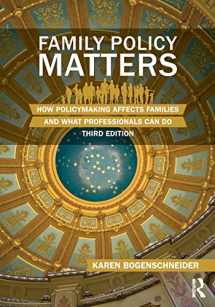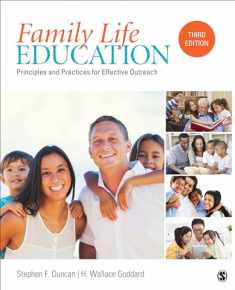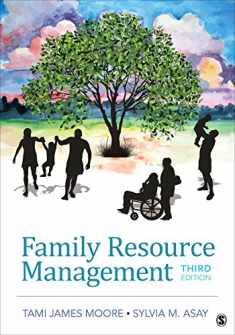
Family Policy Matters: How Policymaking Affects Families and What Professionals Can Do
Book details
Summary
Description
This best-selling text integrates the latest research and cutting-edge practice to make an evidence-based case for family policy. It uses examples from around the globe to explain how families support society and how policies support families. The book also moves beyond analysis to action with pragmatic processes and procedures for improving the effectiveness and efficiency of policies by viewing them through the lens of family impact.
Highlights of the new edition include:
- Extensive revisions with many new references and policies that reflect recent changes in the economy, politics, and family forms and familes.
- Many new learning tools including guiding questions, more tables and figures, chapter glossaries, discussion questions, and chapter summaries.
- Enhanced global perspective with a new chapter (5) that features what policies nations have put in place to strengthen and support families.
- A new chapter (8) that views how family considerations can improve the effectiveness of policy decisions on issues such as early childhood care and education, health care, juvenile crime, long-term care, parent education, and welfare reform.
- A new chapter (11) on what the policy process and policymakers are really like including how a bill becomes a law.
- A new chapter (12) that provides a theoretical and empirical rationale for viewing issues through the family impact lens and what innovative tools and procedures exist for analyzing the family impact of organizations, policies, programs, and practices.
- Several chapters that review what professionals can do in the policy arena and how they can foster compromise and common ground.
- Updated web-based teaching materials including sample syllabi, classroom activities and assignments, daily lesson plans, test questions, instructor insights, video links, web resources, and more.
Part 1 highlights what family policy is and why it’s important and how family life in the U.S. differs from other countries. Part 2 examines the contributions family considerations can bring to issues such as early childhood education, health care, juvenile crime, long-term care, and welfare reform. Part 3 explains why polarization has stymied progress in family policymaking and guidelines for fostering compromise. Insights are drawn from the history of family policy over the last century. Part 4 provides strategies for getting involved in family policymaking. It reviews: the processes policymaking institutions use to enact legislation; new techniques for assessing the family impact of policies and programs; strategies for building better public policies; and various professional roles and careers for building family policy. The book concludes with a summary of how and where we go from here.
Intended for advanced undergraduate and/or graduate courses in family or social policy taught in human development and family studies, psychology, counseling, social work, sociology, public policy, home economics, consumer science, and education, researchers and practitioners alike appreciate this book’s integration of theory, research, and practice.


We would LOVE it if you could help us and other readers by reviewing the book
Book review





